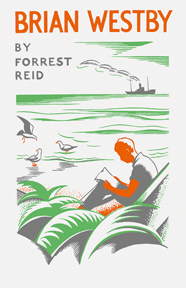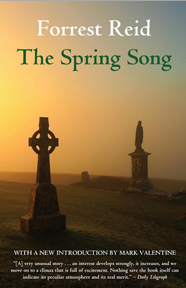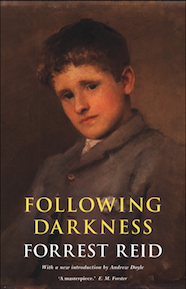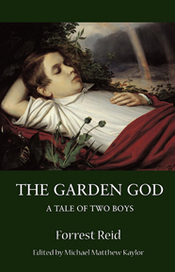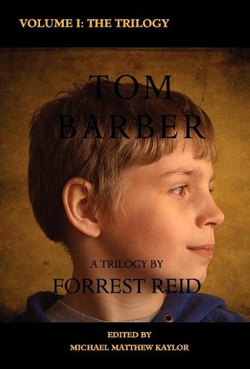
The Tom Barber Trilogy (2 vols.) Vol. 1
Forrest Reid
Edited by Michael Matthew Kaylor
Book Description
Forrest Reid (1875-1947), the Ulster novelist, spent his life in Belfast, in the north of Ireland, save for a period as an undergraduate at Christ's College, Cambridge, where he received a B.A. in 1908. He numbered among his many friends and acquaintances George William Russell (A.E.), E. M. Forster, Edmund Gosse, C. S. Lewis, and Walter de le Mare, as well as various Uranians such as Theo Bartholomew, Osbert Burdett, and Mark André Raffalovich.
Despite his sixteen novels, his two autobiographies, and a range of other works, despite being a founding member of the Irish Academy of Letters and an honorary Doctor of Letters of Queen's University in Belfast, despite his novel Young Tombeing awarded the James Tait Black Memorial Prize, Forrest Reid closely borders both oblivion and canonicity. However, this author, who has been aptly dubbed the "Arch-Priest of a Minor Cult," deserves reconsideration and perhaps a place in the pantheon of English letters.
The Tom Barber Trilogy - composed of the very distinct novels Uncle Stephen (1931), The Retreat; or, The Machinations of Henry (1936), and Young Tom; or, Very Mixed Company (1944) - is Forrest Reid's magnum opus. The present scholarly edition presents those three novels as clean texts (in Volume I), followed by a study of Forrest Reid and explanatory notes for the trilogy (in Volume II).
Forrest Reid
Edited by Michael Matthew Kaylor
Book Description
Forrest Reid (1875-1947), the Ulster novelist, spent his life in Belfast, in the north of Ireland, save for a period as an undergraduate at Christ's College, Cambridge, where he received a B.A. in 1908. He numbered among his many friends and acquaintances George William Russell (A.E.), E. M. Forster, Edmund Gosse, C. S. Lewis, and Walter de le Mare, as well as various Uranians such as Theo Bartholomew, Osbert Burdett, and Mark André Raffalovich.
Despite his sixteen novels, his two autobiographies, and a range of other works, despite being a founding member of the Irish Academy of Letters and an honorary Doctor of Letters of Queen's University in Belfast, despite his novel Young Tombeing awarded the James Tait Black Memorial Prize, Forrest Reid closely borders both oblivion and canonicity. However, this author, who has been aptly dubbed the "Arch-Priest of a Minor Cult," deserves reconsideration and perhaps a place in the pantheon of English letters.
The Tom Barber Trilogy - composed of the very distinct novels Uncle Stephen (1931), The Retreat; or, The Machinations of Henry (1936), and Young Tom; or, Very Mixed Company (1944) - is Forrest Reid's magnum opus. The present scholarly edition presents those three novels as clean texts (in Volume I), followed by a study of Forrest Reid and explanatory notes for the trilogy (in Volume II).
|
BOOK DETAILS
Hardcover with dust jacket ISBN-13: 978-1934555866 List Price: $39.99 U.S. Pages: 656 Published: 2011 |
MORE TITLES BY THIS AUTHOR
SEE THE COMPLETE LIST OF TITLES HERE
AUTHOR BIOGRAPHY
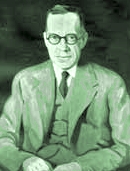
Forrest Reid was born in Belfast in 1875, the youngest of a large family. His father died when he was still a young child, and much of his upbringing therefore fell to his rather conventional mother and his elder sisters. As a youth he felt ill at ease with what seemed the narrow piety of his family’s Presbyterian faith, and their solid middle-class values. After a local schooling, he was apprenticed at age eighteen to the tea trade. The work was not demanding, and Reid coped with the tedium of commercial life by retreating into a dream world of wonder and beauty, inspired by his reading of the Greek classics.
Reid later disowned his first two novels, The Kingdom of Twilight (1904) and The Garden God (1905). The latter novel risked controversy with its portrayal of romantic friendship between two boys; Reid dedicated it to his literary idol Henry James, who was outraged and never spoke to Reid again. After the death of Reid’s mother, a small legacy enabled him to devote himself more fully to his writing, and in the 1910s he published a string of excellent, though not commercially successful novels, including The Bracknels (1911),Following Darkness (1912) (said to have been an influence on Joyce’s Portrait of the Artist as a Young Man), At the Door of the Gate (1915), The Spring Song (1916), and Pirates of the Spring (1919).
The best of Reid’s works, though, came later in life, beginning with Uncle Stephen (1931), which, with The Retreat (1936) and Young Tom (1944), made up the Tom Barber trilogy, regarded by many as his masterpiece; the final book in the trilogy won the James Tait Black Memorial Prize as the best novel published in 1944. Reid’s other mature work includes Brian Westby (1934), inspired by Reid’s friendship with nineteen-year-old Stephen Gilbert, who also went on to become a novelist, and Peter Waring (1937) and Denis Bracknel (1947), rewritten versions of Following Darkness and The Bracknels, respectively. Reid died in 1947, critically well-regarded, but never having achieved the widespread popular recognition he deserved. When Valancourt Books reprinted The Garden God in 2007, all of Reid’s books were out of print. Valancourt is now in the process of restoring Reid’s best works to print.
Reid later disowned his first two novels, The Kingdom of Twilight (1904) and The Garden God (1905). The latter novel risked controversy with its portrayal of romantic friendship between two boys; Reid dedicated it to his literary idol Henry James, who was outraged and never spoke to Reid again. After the death of Reid’s mother, a small legacy enabled him to devote himself more fully to his writing, and in the 1910s he published a string of excellent, though not commercially successful novels, including The Bracknels (1911),Following Darkness (1912) (said to have been an influence on Joyce’s Portrait of the Artist as a Young Man), At the Door of the Gate (1915), The Spring Song (1916), and Pirates of the Spring (1919).
The best of Reid’s works, though, came later in life, beginning with Uncle Stephen (1931), which, with The Retreat (1936) and Young Tom (1944), made up the Tom Barber trilogy, regarded by many as his masterpiece; the final book in the trilogy won the James Tait Black Memorial Prize as the best novel published in 1944. Reid’s other mature work includes Brian Westby (1934), inspired by Reid’s friendship with nineteen-year-old Stephen Gilbert, who also went on to become a novelist, and Peter Waring (1937) and Denis Bracknel (1947), rewritten versions of Following Darkness and The Bracknels, respectively. Reid died in 1947, critically well-regarded, but never having achieved the widespread popular recognition he deserved. When Valancourt Books reprinted The Garden God in 2007, all of Reid’s books were out of print. Valancourt is now in the process of restoring Reid’s best works to print.

